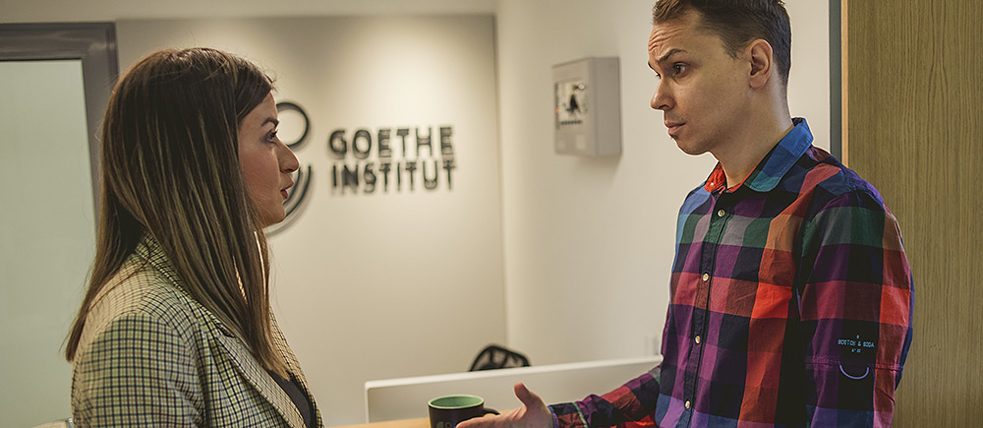Language teaching meets migration advice

The Goethe-Institut uses pre-integration projects to prepare migrants for migration to Germany while they are still in their countries of origin. A three-week seminar was held recently to give people involved in the project living in South-East Asia and South-East Europe an opportunity to share information with migration advisors from Germany.
By Janna Degener-Storr
A query received by jmd4you, the Youth Migration Services (Jugendmigrationsdieste) online advice centre: social worker Herbert Neumann from Rotenburg (Wümme) finds a message from a Brazilian girl in the advice centre inbox. Her grandparents fled from Germany in the 30s as Jewish migrants, and now she wants to return with her daughter because of the political changes: “What opportunities are there for me to finance my life over there? Can my daughter study in Berlin?” she asks.
Around fifteen hundred kilometres away, in his office at the Goethe-Institut in Belgrade, Nemanja Vlajkovic is providing pre-integration advice. Today he is sitting with a young Serbian woman who has been offered a job as a bus driver in Stuttgart. “What form do I have to fill in if I want to live in Germany? Can my daughter attend school there?” she asks. “And what’s the traffic actually like in Germany? Is there as much congestion there?”
Pre-integration at the Goethe-Institut
Since joining spouses from non-EU countries have had to prove language skills at A1 level before migration to Germany after the law was revised in 2007, the Goethe-Institut has been running pre-integration projects in the main countries of origin, to prepare migrants for life in Germany. Since then the focus of these measures has shifted to include professional migrants. The Goethe-Intsitut has been cooperating with the Youth Migration Services in Germany for some years. The “Mein Weg nach Deutschland” portal for instance gives information about the anonymous, free online advice service for young people, jmd4you, which advises young people specifically in response to their questions on the subject of migration while they are still in their home countries.In the current project “Pre-integration in the Regions of South-East Asia and South-East Europe”, the Goethe-Institut is aiming to professionalise its advisory work in the home countries even further – and is adopting a strategy of even closer collaboration with advice centres such as the Youth Migration Services to achieve this. The idea is for both parties to benefit from this information sharing. “The colleagues providing advice locally are familiar with the problems migrants have before departure. And we’re the experts with regard to what happens next. If both sides come together, we can provide effective support for the migration experience from start to finish”, explains Özcan Ülger, project leader for the JMD online advice service.
Information sharing with migration advisors
The new cooperation kicked off with a training course for advisors involved in the Goethe-Institut pre-integration project, which was held at the start of December 2018 in Germany. It included a two-day introduction in Munich and six observation days at advice centres run by the Youth Migration Services in Munich, Nuremberg, Augsburg, Berlin, Montabaur and in the Offenburg/Schwarzwald district, followed by an evaluation day. Project coordinator Andrea Hammann explains: “A colleague from each of the locations involved was present. A total of seventeen people attended the first two seminar days, and twelve colleagues from the project countries took part in the observations.” The event offered participants an opportunity to ask questions relating to both organisation and content, chat with the JMD staff, and receive both theoretical and practical input relating to advice centre work.What does migration to Germany mean?
Figen Akgün, who attended the seminar in her capacity as project worker from the Izmir centre, found participation in the neighbourhood research task especially rewarding: “We lay the foundations in our country so that migrants don’t feel so much like outsiders once they arrive in Germany. It was helpful to experience what to expect for themselves, for instance when they had to research schools in an unfamiliar city. Even if someone speaks good German, it’s a challenge to make contact with people and to find their bearings.”Participants also deal with the intercultural and personal challenges of migration. “Relocating to a different country can change the equilibrium of a relationship significantly, for example. Joining spouses often feel powerless all of a sudden compared with their husband or wife, which can place huge demands on couples. And professional migrants often experience a crisis after a certain honeymoon period. If we prepare people even before their departure, they are able to categorise these experiences straight away and cope with them better,” explains Herbert Neumann from the Youth Migration Services.
Observation in migration advice centres
The observations provided participants with the opportunity to become familiar with the day-to-day running of the migration advice centres in Germany. Thanh Huong Nguyen from the Goethe-Institut Hanoi particularly remembered advising a Syrian father: his neighbour had complained to the landlord that his children were making too much noise in the flat. “Dealing with noise is a key aspect of intercultural preparation for us, because things sometimes tend to be a bit louder here in Vietnam, and our seminar attendees need to be made aware that the Germans have a right to peace and quiet within their own four walls at certain times of the day,” she says.For some seminar participants it was also a huge relief to discover that advisors don’t have to have a spontaneous answer to every question ready. For example, until a few months ago when the pre-integration project started, Lejla Djelilovic from the Goethe-Institut Sarajevo mainly used to give advice on questions relating to language learning, and now sometimes feels out of her depth when faced with complex themes such as recognition of certificates – particularly as the legal requirements keep changing in this field: “It has helped me to see that I don’t have to know everything,” she admits. Furthermore, Clara Mutiarasari from the Goethe-Institut Jakarta speaks of cultural challenges: “In Asian countries it is unusual to admit that you don’t know something. So it was fantastic for me to see an advisor in a situation where they openly admit that they would have to find out the answer to the question first.”
A strong network
At the end even the less-experienced pre-integration project staff were able to return to their locations after a weekend of training and information sharing with a good feeling – and the knowledge that they can always count on support from the pre-integration network if anything is unclear: because all they need to do is reach for the telephone to access the experience and expertise of their colleagues at the other Goethe-Institut locations as well as the migration advice centres in Germany.Funded by:
